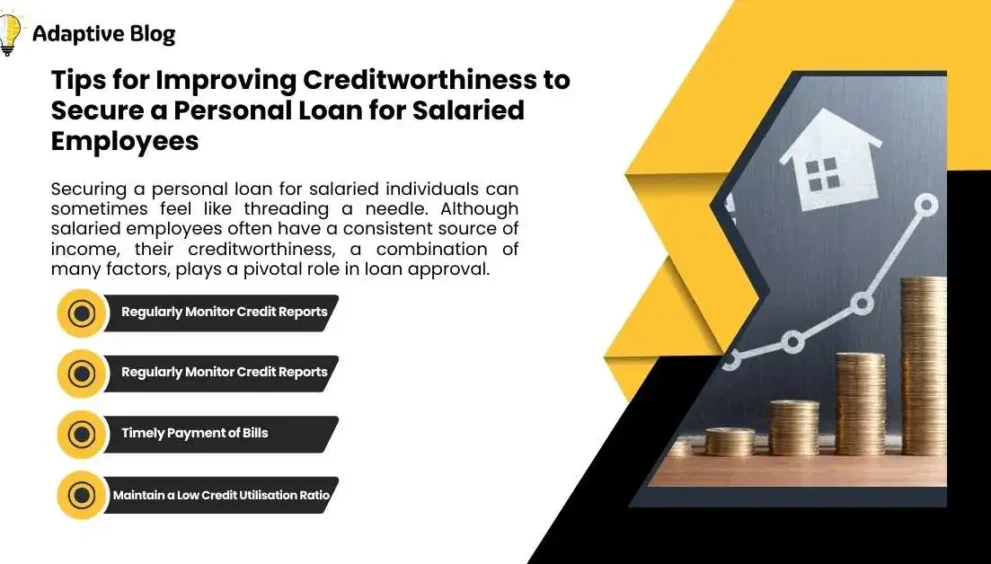Tips for Improving Creditworthiness to Secure a Personal Loan for Salaried Employees

Securing a personal loan for salaried individuals can sometimes feel like threading a needle. Although salaried employees often have a consistent source of income, their creditworthiness, a combination of many factors, plays a pivotal role in loan approval.
Here, we shall demystify the steps one can undertake to enhance creditworthiness, ensuring that the pathway to obtaining a personal loan for salaried employees is smoothed out.
Additionally, we’ll explain how to check personal loan eligibility, ensuring you’re well-prepared before approaching lenders.
Understanding Creditworthiness
Creditworthiness is a pivotal concept in the financial realm. At its core, it represents an individual’s propensity to honor financial commitments.
Essentially, it reflects how trustworthy one is in repaying borrowed funds. Lenders heavily rely on this metric as a barometer to gauge the potential risk associated with lending.
Lenders make informed predictions about an individual’s future financial actions by assessing past financial behaviors, such as loan repayments and credit card settlements. Thus, a person’s creditworthiness can be the decisive factor in loan approvals, personal loan interest rates, and credit limits.
Ways to Bolster Creditworthiness
Regularly Monitor Credit Reports
Start by obtaining your credit report. This provides insights into your financial health and any potential red flags. Regular monitoring allows you to spot and rectify discrepancies, ensuring your credit score isn’t unfairly tarnished.
Creditworthiness is a cornerstone in the financial landscape, determining the ease of access to funds. Improving this metric is akin to building trust in the world of lenders. Here’s a detailed breakdown of steps to enhance creditworthiness:
Regularly Monitor Credit Reports
It’s essential to periodically check your credit report, a comprehensive record of your borrowing and repayment history.
This not only helps you understand where you stand but also enables you to identify any inaccuracies or suspicious activities. By being proactive, you ensure that your credit score remains a genuine reflection of your financial discipline.
Timely Payment of Bills
Consistency is key. Whether it’s your monthly electricity bill or a quarterly insurance premium, paying on time strengthens your credit report. Delayed payments, even if infrequent, can leave a dent in your score, signaling unreliability to prospective lenders.
Maintain a Low Credit Utilisation Ratio
While having credit cards offers flexibility, it’s crucial to use them judiciously. A rule of thumb suggests utilizing no more than 30% of your credit limit. This restraint not only aids your credit score but also portrays you as a responsible borrower.
Limit Loan Enquiries
Every loan application triggers a hard check on your credit report, causing minor, temporary drops in your score. Numerous checks within a short period might raise alarms, hinting at financial instability or desperation.
Avoid Excessive Unsecured Loans
Diversity in your credit portfolio can be beneficial. While unsecured loans are easily accessible, diversifying with secured loans like mortgages or vehicle loans showcases a more balanced and responsible borrowing history.
Length of Credit History
The duration of your credit history can be a double-edged sword. Older, well-maintained accounts reflect a long-standing habit of responsible credit management, boosting your creditworthiness.
Correct Mistakes in Credit Report
Ensure your report’s accuracy. Mistakes, from misreported balances to fraudulent accounts, can adversely affect your score. Promptly address and rectify such errors with the credit bureau.
Diversify Your Credit Types
A mix of different credit types – retail accounts, instalment loans, credit cards – can be favourable. It provides lenders with evidence of how you handle multiple financial responsibilities.
Reduce Debt-to-Income Ratio
This ratio is the percentage of your monthly income for debt repayments. A lower ratio signifies that a good portion of your income remains after managing existing debts, making you an attractive proposition for lenders.
How to Check Personal Loan Eligibility
Once you’ve improved your creditworthiness, the next step is to ascertain your eligibility. Here’s how to check personal loan eligibility: Below is step-by-step guidance.
Visit the Lender’s Website
Most financial institutions offer online tools to check your eligibility. Enter details like your income, existing financial obligations, and the loan amount sought.
Credit Score Requirements
Lenders typically have a minimum credit score threshold. While this can vary, a score above 750 is generally deemed favorable.
Debt-to-Income Ratio
Lenders assess how much of your income is already committed to existing debts. A lower ratio indicates higher eligibility.
Employment Stability
As a salaried employee, having a stable job with a reputed organization can enhance your eligibility.
Use Online Eligibility Calculators
Many financial platforms provide online calculators. You can get a quick estimate of your loan eligibility by inputting basic details.
Also Read: Step To Hire Flutter App Developers For Your Projects
Conclusion
While the journey towards securing an online personal loan for salaried individuals can seem daunting, it becomes significantly more manageable with the right steps and a keen understanding of the process.
By maintaining a robust credit history and understanding how lenders gauge eligibility, you place yourself in a prime position to secure the financial assistance you seek. Remember, in finance, preparation and knowledge are your best allies.





